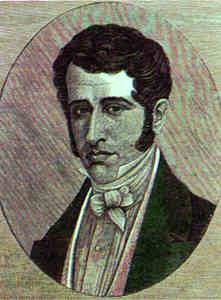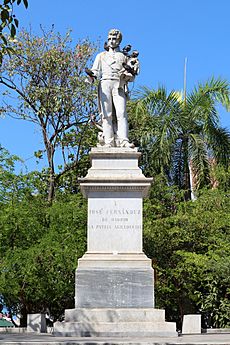José Fernández Madrid facts for kids
Quick facts for kids
José Fernández Madrid
|
|
|---|---|
 |
|
| Presiding Member of the Triumvirate of the United Provinces of the New Granada | |
| In office October 5, 1814 – January 21, 1815 |
|
| Preceded by | Camilo Torres Tenorio |
| Succeeded by | Triumvirate Custodio García Rovira, Antonio Villavicencio, Manuel Rodríguez Torices |
| President of the United Provinces of the New Granada | |
| In office March 14, 1816 – June 22, 1816 |
|
| Preceded by | Camilo Torres Tenorio |
| Succeeded by | Liborio Mejía |
| Envoy Extraordinary and Minister Plenipotentiary of Colombia to France | |
| In office March 25, 1827 – November 23, 1827 |
|
| 2nd Envoy Extraordinary and Minister Plenipotentiary of Colombia to the United Kingdom | |
| In office 27 March 1828 – 28 June 1830 |
|
| President | Simón Bolívar Palacios |
| Preceded by | Francisco Antonio Zea Díaz |
| Personal details | |
| Born | February 19, 1789 Cartagena de Indias, Bolívar, Colombia |
| Died | June 28, 1830 Barnes, London, England |
| Spouse | María Francisca Domínguez de la Roche |
|
|
José Fernández Madrid (born February 19, 1789 – died June 28, 1830) was an important leader from what is now Colombia. He was a statesman, a doctor, a scientist, and a writer. He served as a temporary leader of the United Provinces of New Granada in 1814. He also became president of the United Provinces in 1816. When Spain took back control, he had to leave the country. He lived in Havana, where he kept studying science and working as a doctor. Later, he was allowed to return to Colombia. He became an ambassador for his country in France and the United Kingdom, where he passed away.
Contents
Early Life and Education
José Fernández Madrid was born in Cartagena de Indias, Bolívar, on February 19, 1789. His family was wealthy and important. His father, Pedro Fernández de Madrid, held high positions in the Spanish government in the New World. His grandfather was a knight and a judge for the King of Spain.
José started his schooling in Cartagena. His family then moved to Santa Fe de Bogotá because his father got a new job. In Bogotá, he continued his studies at the Our Lady of the Rosary University. He first studied humanities and law. Later, he went back to earn his doctorate in Medicine. He finished his medical degree on February 16, 1809, before he turned 20 years old.
Early Political Career
In 1810, big changes were happening as people sought independence from Spain. Fernández Madrid was in Cartagena during these revolutionary times. He got his first job as the main lawyer for the Province of Cartagena. He was part of the first independence movements in the city. Cartagena declared its full independence on November 11, 1811.
He was later chosen to represent Cartagena in the Congress of the State of Cartagena de Indias. In 1812, he became a representative for his province in the Congress of the United Provinces of the New Granada. This Congress met in Villa de Leyva. He was known for being very smart and a great speaker. His writings also made him well-respected by his colleagues.
Serving in the Triumvirate
On October 5, 1814, the leaders of the United Provinces decided on a new way to govern. They chose to have a group of three leaders, called a triumvirate, instead of just one president. Congress elected three people for this triumvirate. However, since they were not available, Congress chose José María del Castillo y Rada, José Joaquín Camacho, and Fernández Madrid as temporary leaders.
This temporary triumvirate governed the country starting from October 5, 1814. Fernández Madrid was the head of this group until March 28, 1815. At that time, one of the originally elected members, Custodio García, was able to take his place.
Presidency in 1816
By 1816, the country was in a very difficult situation. Spain was trying to take back control of its former colonies. This effort was called the Spanish reconquest. General Pablo Morillo was leading the Spanish forces. He had already captured Cartagena de Indias in December 1815. Many important leaders were leaving their posts because of the danger.
On March 14, 1816, the president, Camilo Torres Tenorio, resigned. The Congress of the United Provinces asked Fernández Madrid to become president. He first said no. He knew he was not the right person to solve the invasion problem. But his peers pressured him, and he accepted the role.
On May 6, the Spanish royalists invaded Santa Fe de Bogotá. This event marked Spain's success in retaking New Granada. Fernández Madrid was only 27 years old and had no military experience. He marched south with the few remaining soldiers. On June 22, 1816, he resigned from the presidency in Popayán. The Congress accepted his resignation. They named General Custodio García Rovira as the new president. Liborio Mejía became vice president and acted as president since Rovira was not present.
Capture and Exile
On June 30, after a battle called Cuchilla del Tambo, Fernández Madrid and his wife were captured. They were trying to find refuge with the Andaquí Indians. Being captured meant he could face a death sentence, like many other leaders during the Reconquista.
He asked for forgiveness and requested a meeting with General Morillo. Because his family had served the king for a long time, and because he had not been involved in military actions, his life was spared. Instead, he was sent into exile in Spain. His wife, María Francisca Domínguez de la Roche, and his brother also went with him. Morillo told him: "Within three days you will leave for the Capital [Madrid]. Go learn loyalty from your relatives! Do not think you are fooling me, you are an insurgent and you will be one till death."
While in exile, Fernández Madrid founded a newspaper called El Argos. The first edition came out on June 5, 1820. It had 34 editions and promoted the idea of uniting the people of America.
Ambassador to Europe
On November 23, 1826, Simón Bolívar appointed Fernández Madrid as the ambassador to the United Kingdom. He was in Paris at the time, and the government urged him to go to London quickly. He received a yearly salary of 12,000 pesos. José Fernández Madrid arrived in London on April 30, 1827.
Legacy and Works
José Fernández Madrid's son, Pedro Fernández Madrid, was born in Cuba during his father's exile. He grew up to be an important politician and writer, just like his father. Pedro served as a congressman and was president of the Congress in 1857.
Literary Works
- Poesías (1945)
- Guatimoc ó Guatimocin: Tragedia en cinco actos (1835)
Awards in His Honor
On July 22, 1950, the Colombian Armed Forces created an award in his honor. It is called the Order of Health Merit Jose Fernandez Madrid (Orden al Merito Sanitario José Fernández Madrid). This award is given to military doctors and other military personnel. It recognizes acts of bravery, excellent service, or outstanding contributions to science, military medicine, or medical teaching and research.
See also
 In Spanish: José Fernández Madrid para niños
In Spanish: José Fernández Madrid para niños
 | George Robert Carruthers |
 | Patricia Bath |
 | Jan Ernst Matzeliger |
 | Alexander Miles |


